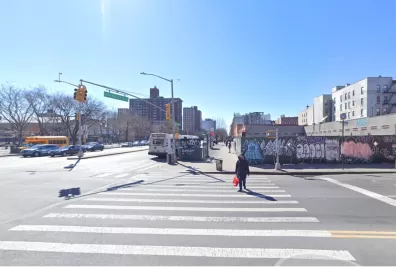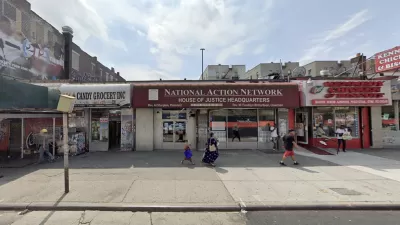After a proposal for a mixed-use development failed to gain support from a local city councilmember, the developer turned the site into a truck storage depot, prompting concerns over air quality and health impacts.

After a local councilwoman protested a proposed housing development on a Harlem lot, citing gentrification concerns, the developer chose to use the site for a truck depot instead. “Their fight reflects the challenge of building housing in New York,” write Emma G. Fitzsimmons and Mihir Zaveri in the New York Times.
The proposal, which was supported by Mayor Eric Adams, included over 900 housing units, with 10 percent set aside for households making less than $40,020 per year. Councilwoman Kristin Richardson Jordan “said she would have agreed to the project had Mr. Teitelbaum agreed to include more homes that were affordable to people with lower incomes — making a fifth of the apartments available to families of four earning $40,020 per year, for example, and reserving half of the apartments for families of four earning up to about $80,040.” Jordan called her proposal “an extreme compromise” that would still result in massive profits for the developer.
The decision to replace the proposed apartment tower with truck parking raises the stakes of New York’s already tense debate over housing, with neighbors accusing developer Bruce Teitelbaum of intentionally causing harm with the polluting, noisy facility. Teitelbaum says he is considering other options for the lot that would not require city approval, like a smaller apartment building or a self storage facility.
FULL STORY: Why Harlem Is Getting a Truck Depot Instead of New Housing

Alabama: Trump Terminates Settlements for Black Communities Harmed By Raw Sewage
Trump deemed the landmark civil rights agreement “illegal DEI and environmental justice policy.”

Planetizen Federal Action Tracker
A weekly monitor of how Trump’s orders and actions are impacting planners and planning in America.

Why Should We Subsidize Public Transportation?
Many public transit agencies face financial stress due to rising costs, declining fare revenue, and declining subsidies. Transit advocates must provide a strong business case for increasing public transit funding.

Understanding Road Diets
An explainer from Momentum highlights the advantages of reducing vehicle lanes in favor of more bike, transit, and pedestrian infrastructure.

New California Law Regulates Warehouse Pollution
A new law tightens building and emissions regulations for large distribution warehouses to mitigate air pollution and traffic in surrounding communities.

Phoenix Announces Opening Date for Light Rail Extension
The South Central extension will connect South Phoenix to downtown and other major hubs starting on June 7.
Urban Design for Planners 1: Software Tools
This six-course series explores essential urban design concepts using open source software and equips planners with the tools they need to participate fully in the urban design process.
Planning for Universal Design
Learn the tools for implementing Universal Design in planning regulations.
Caltrans
Smith Gee Studio
Institute for Housing and Urban Development Studies (IHS)
City of Grandview
Harvard GSD Executive Education
Toledo-Lucas County Plan Commissions
Salt Lake City
NYU Wagner Graduate School of Public Service





























